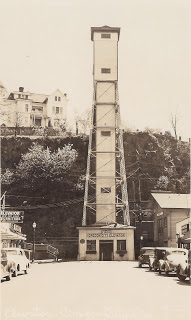 |
| Oregon City municipal elevator |
Your Northwest History Network board has been discussing future NHN activities in the light of what the organization is now doing, has done in the past, and would like to do.
As many of you know, we’ve enjoyed some terrific accomplishments over the last couple of years – including effective advocacy for access to historical resources, incubating the Century of Action project (which has become a project of the new non-profit, Oregon Women’s History Consortium) through a grant application and administration, regular opportunities to for our associates to network, and popular public programs, including the history of the Black Panthers, race and urban renewal, and a special screening of Lois Leonard’s film “Finding David Douglas.”
As we look forward to the upcoming year and beyond, we’ve been discussing what we should focus on. We’re sharing our thoughts with the hope of hearing yours – in person at one of our socials, via email, or by calling any one of us. This is your association, so let’s figure out how it can best support your work.
Some highlights of the board’s discussion:
As many of you know, we’ve enjoyed some terrific accomplishments over the last couple of years – including effective advocacy for access to historical resources, incubating the Century of Action project (which has become a project of the new non-profit, Oregon Women’s History Consortium) through a grant application and administration, regular opportunities to for our associates to network, and popular public programs, including the history of the Black Panthers, race and urban renewal, and a special screening of Lois Leonard’s film “Finding David Douglas.”
As we look forward to the upcoming year and beyond, we’ve been discussing what we should focus on. We’re sharing our thoughts with the hope of hearing yours – in person at one of our socials, via email, or by calling any one of us. This is your association, so let’s figure out how it can best support your work.
Some highlights of the board’s discussion:
- In the past five years, regional history-related public programs have expanded dramatically, thanks to such groups as the Oregon Encyclopedia, Architectural Heritage Center, McMenamin’s, Friends of History (FOH) and Public History Graduates (PHiG) at PSU, the local chapter of the Northwest Independent Scholars Association, the Oregon Historical Society, and the Dill Pickle Club. When NHN was founded, these opportunities simply didn’t exist.
- Professional development opportunities for historians who are outside of academia are very slim
- Networking and sharing opportunities for regional historians are scarce
- Greater efforts need to be made to help regional historians collaborate with one another, to work with potential employers of historians and users of history, to develop history projects and products: in short, to pay historians to do their work
In response, the board has adopted a tentative calendar for the next year and a half. The primary effects are these:
- We will offer two public programs each year with an emphasis, whenever possible, on promoting the work of our associates
- There will be two programs a year, aimed directly at our associates, dealing with professional development issues — the first of these will be held on January 24 at the Architectural Heritage Center, regarding internet tools for historians.
- We will continue our (mostly) monthly social events with updates from associates on their work and projects, and will introduce new and potential members. We will also suggest topics in history to generate discussion that may lead to future professional development or public programs
As your board works on fleshing out the NHN calendar (http://www.northwesthistory.org/p/nhn-calendar.html), we appreciate hearing from you: suggest program topics, possible speakers or panel members, social event venues, etc. – and any other thoughts you have.
NHN is an all-volunteer agency that works best when we work together – thank you for being a part of it!
